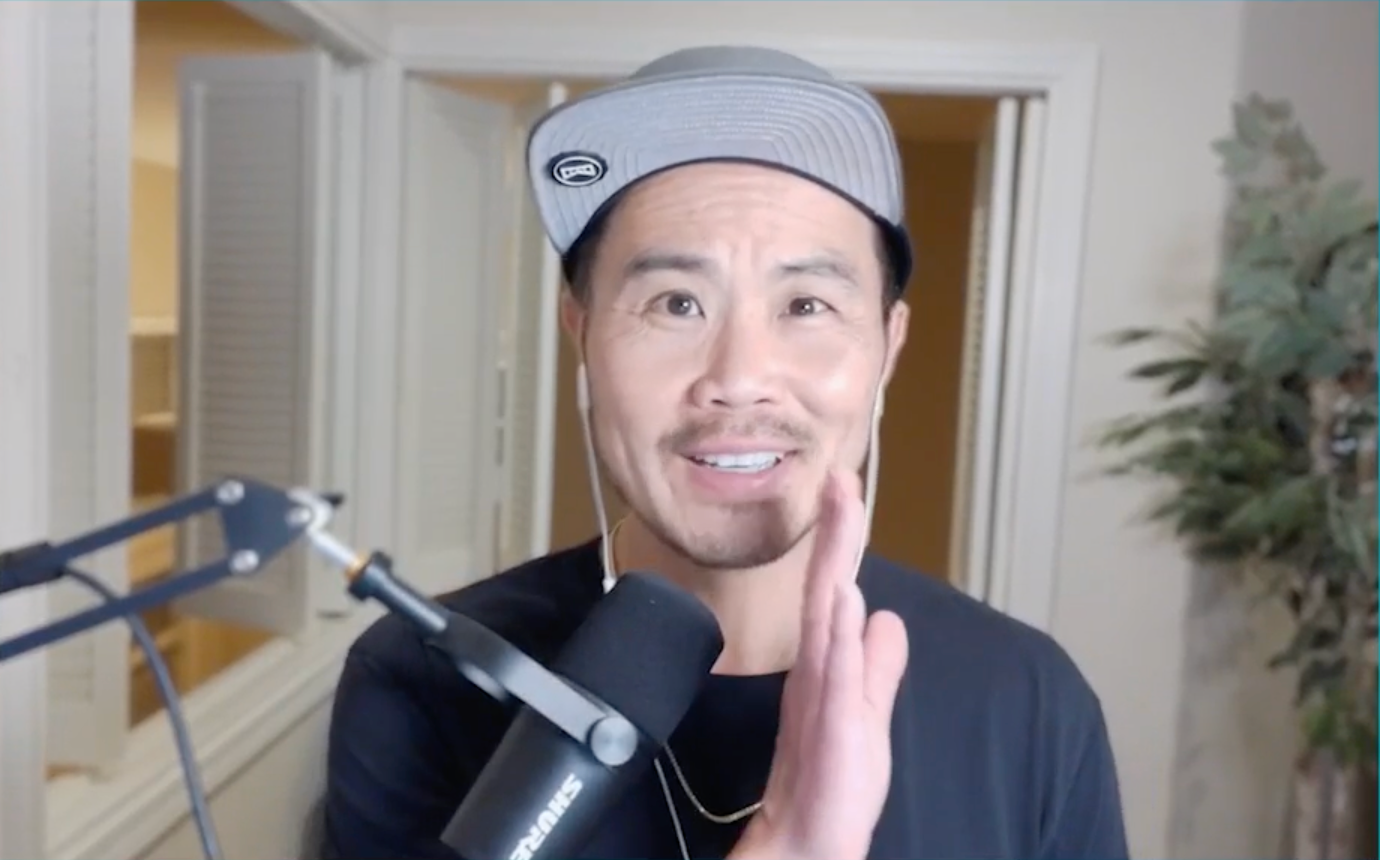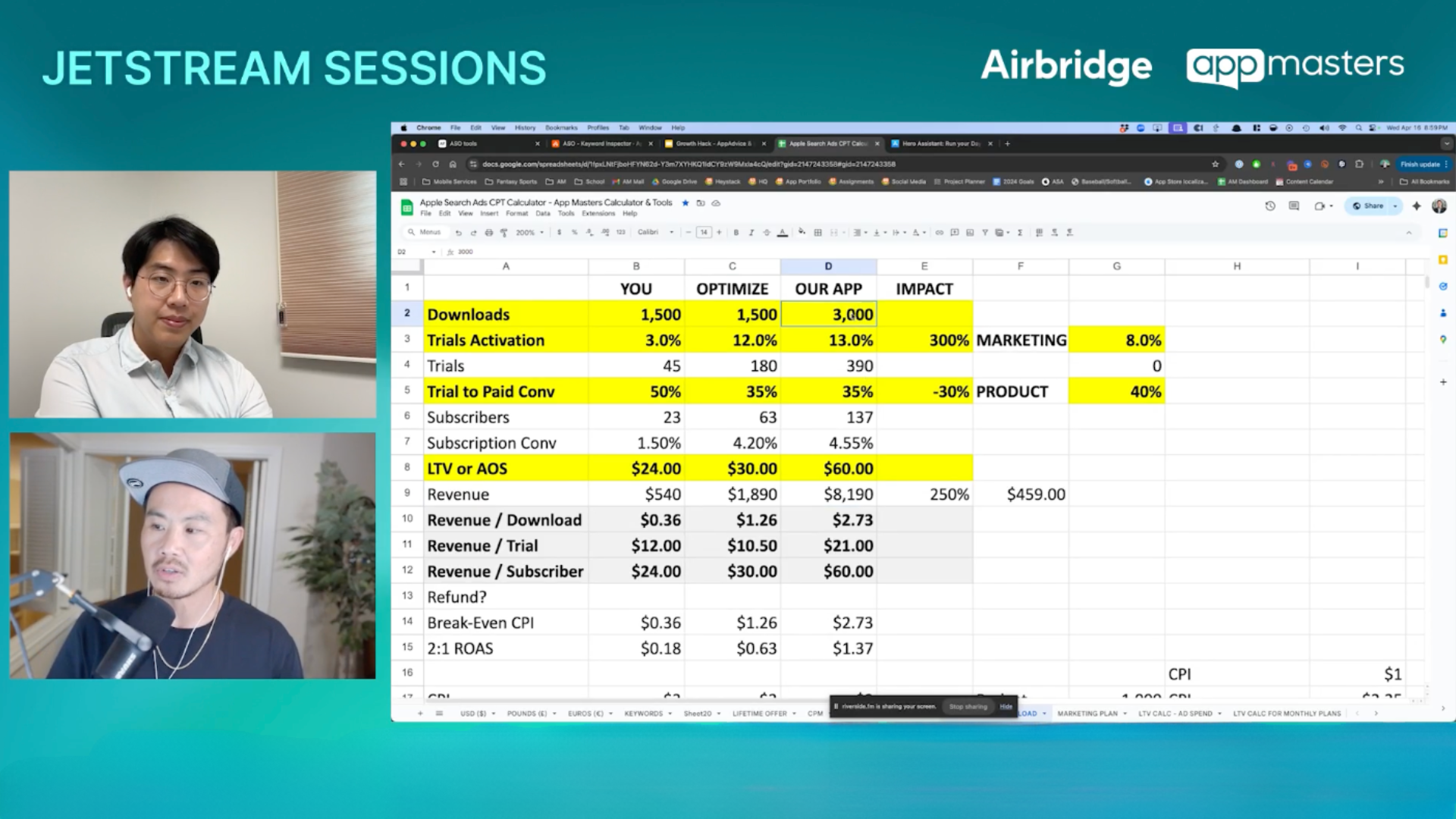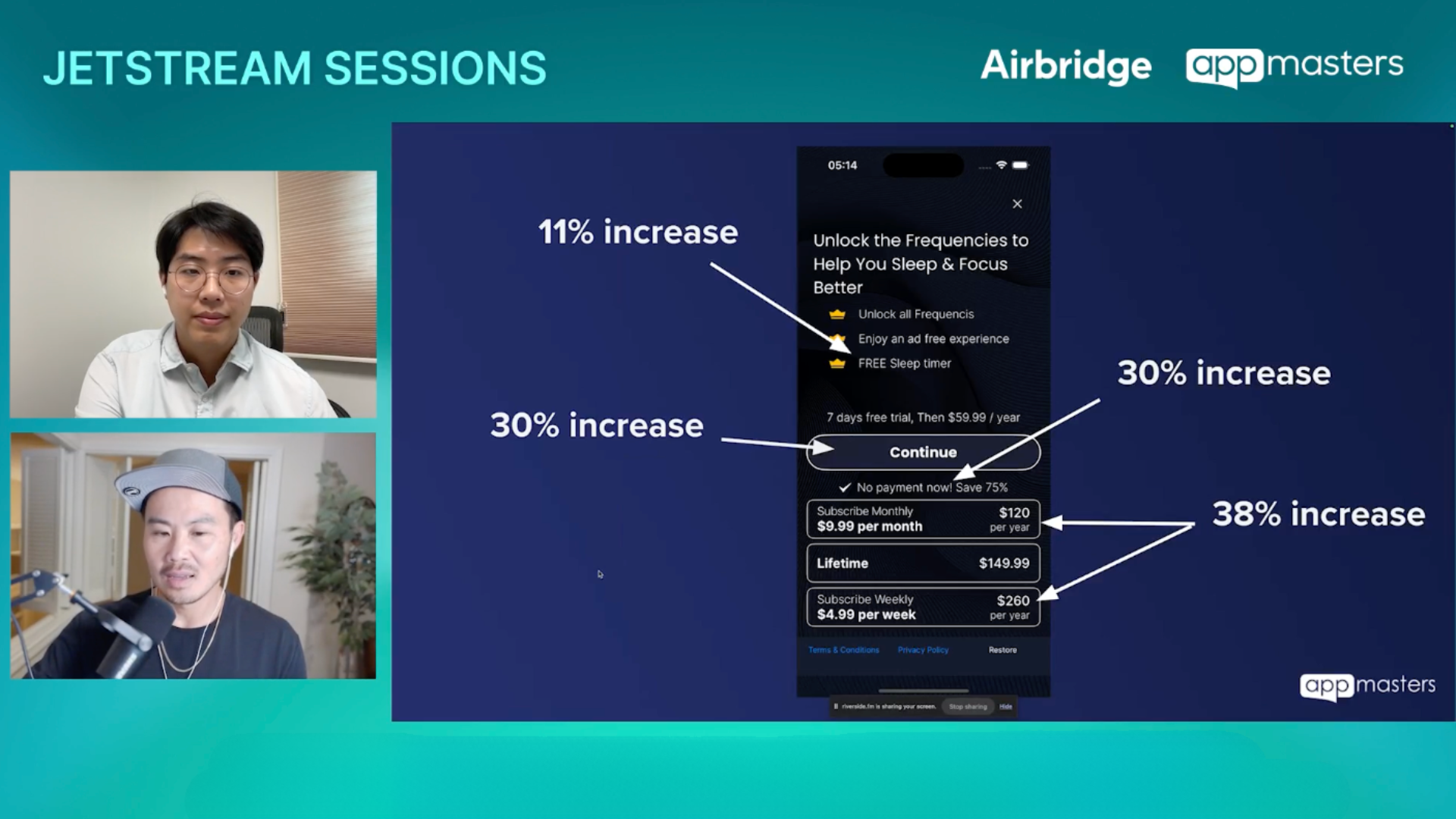

The subscription app market is more competitive than ever. From fitness and wellness to productivity and dating, users have endless choices while marketers face rising acquisition costs, tighter privacy rules, and pressure to prove sustainable growth.
In this Jetstream Session, Airbridge CEO Roi Nam sat down with Steve Young, Founder of App Masters and one of the most trusted voices in subscription app growth. With over a decade of experience in ASO, Apple Search Ads (ASA), pricing, and paywalls, Steve has helped hundreds of apps grow with his practical, battle-tested advice. Here’s what he shared on idea validation, early success signals, scaling metrics, and what he calls “The Greatest Growth Hack in Da World.”
🎥 Watch the full interview video
Before diving into tactics it is worth rewinding to Steve’s own journey. In 2011 he was coding iOS apps on his train ride to work in San Francisco, making just enough to keep the dream alive. By 2013 he launched the App Masters podcast, not as an expert but as a learner eager to understand how others were building successful apps.
That curiosity grew into a community and over time gave him a front-row to the mindset that set successful founders apart. Across hundreds of cases he saw the same three qualities surface again and again: persistence, focus, and simplicity.
“Most people give up too soon. My first year full-time, I earned less than my old salary. But I stuck with it.”
— Steve Young, Founder of App Masters
Persistence matters because growth rarely looks good right away. Focus matters because chasing every new channel prevents real learning. Simplicity matters because the best apps double down on the basics until they compound.
“The most successful apps do not pile on complexity. They double down on the basics and let them compound.”
— Steve Young, Founder of App Masters

Everything starts with the right idea, and that means solving a real problem rather than offering a nice-to-have.
“You can make a meditation app, or you can make an app for anxiety relief. Both have demand, but only one solves a pain. Always build the painkiller, not a vitamin.”
— Steve Young, Founder of App Masters
High-intent problems attract users who are more willing to start trials, convert to paid, and stick with the product.To uncover these opportunities, Steve uses Google Trends, AppFigures, and Sensor Tower to spot rising keywords before the market gets crowded.
His rule of thumb is straightforward.
“If you can find just two keywords with a search score of around 30 and win the top ranking, you are already looking at a six-figure opportunity.”
— Steve Young, Founder of App Masters
Once the idea has been validated, the next question is whether the app can grow beyond a promising concept.
After launch, a handful of signals reveal whether an app has real potential to scale. The benchmarks to watch are:

Steve points out that at this stage there is no need for complex subscription tools, since App Store Connect provides all the visibility you need to track progress.
“If I’m paying $1 per install and hitting 70% ROAS, I’m thrilled. Even if I’m not profitable yet, it shows traction I can optimize.”
— Steve Young, Founder of App Masters
When these benchmarks line up, it is a strong indication that the app is ready for growth. Once the signals are clear, the next challenge becomes scaling that growth without losing efficiency.
Once those early signals look promising, the focus shifts to scaling growth. Steve emphasizes keeping the playbook simple and building momentum step by step. Most apps that succeed follow the same progression. They start with ASO to capture high-intent searches. They then layer in ASA to buy additional discovery. Finally, when the economics allow, they turn to Meta Ads for broader reach.
The mistake many teams make is cutting Meta when results look flat. Steve warns against this, because Meta often drives indirect benefits that are not immediately visible in ROAS.
“There’s always a segment that sees your ad, doesn’t click, but searches your app in the App Store. That brand search lifts ASO.”
— Steve Young, Founder of App Masters
This halo effect is what he calls the organic multiplier. Paid campaigns spark awareness, awareness drives brand searches, and brand searches push ASO rankings higher. It is the reason Calm and Headway dominate search results not only for “meditation” but also on their own brand names.
“For Headway and Calm, brand search volume in ASO is bigger than the keyword ‘meditation'.”
— Steve Young, Founder of App Masters
Paywalls remain one of the strongest levers for subscription app growth. Steve points out that the fastest way to boost revenue is ensuring that every single user sees the paywall.
“The fastest way to make more money is making sure 100% of users see your paywall.”
— Steve Young, Founder of App Masters
To get this right, he recommends asking a few simple questions:
Once those basics are covered, experimentation is where growth happens. A few examples Steve shared include:

For early-stage subscription apps, marketing budgets are often tight. That is why Steve recommends starting with ASA. They are keyword-driven, intent-rich, and relatively simple to manage. In one case, a client spent $800 on ASA and earned $3,000 in return, with $2,000 directly attributable to ASA and another $1,000 in organic lift.
Once ASA is running smoothly, the natural next step is Meta Ads. Steve suggests beginning with broad campaigns, then layering in interest clusters as data comes in. But the real unlock, he emphasizes, is in the creative.
“One client’s best-performing video was fully AI. Cheaper and just as effective as UGC.”
— Steve Young, Founder of App Masters
AI has become a secret weapon for subscription apps looking to test creative quickly without overspending. Steve’s team uses Eleven Labs for text-to-speech, Creatify and Arcads for ad variations, and Reel.farm for reaction shots that strengthen hooks. With these tools, even small teams can test dozens of ad concepts at a fraction of the cost of traditional production.
For subscription apps without large budgets, AI is the closest thing to a cheat code, making rapid creative testing both realistic and sustainable.
When asked about growth hacks, Steve did not hesitate. His boldest advice is what he calls “The Greatest Growth Hack in Da World”: lifetime offer campaigns.
The playbook is straightforward. Create a temporary lifetime free or discounted plan, then promote it through discovery platforms like AppAdvice or IndieAppSanta. The results can be explosive.
One client with an AI note-taking app ran this campaign and achieved results that most paid UA strategies could never match. In just two days, the app generated 106,000 installs and 800 new ratings. Monthly revenue jumped from a few hundred dollars to $7,000, and within a year it passed $90,000.
“Where else can you get that kind of lift without spending on ads.”
— Steve Young, Founder of App Masters
What makes this hack so powerful is that the benefits extend beyond revenue. Large install spikes drive reviews, improve App Store visibility, and fuel ASO through download velocity. While it may not work every time, when it does, it can change the trajectory of a subscription app almost overnight.
Looking ahead, Steve is optimistic about subscription apps, but he emphasizes that the fundamentals have not changed since he first entered the industry more than a decade ago.
“Focus beats distraction. Persistence beats quick wins. Simplicity beats over-complication.”
— Steve Young, Founder of App Masters
Whether you are a bootstrapped founder or a marketer at a scaling team, the playbook is the same. Validate with ASO, prove traction with ASA, reinvest with Meta, and never stop testing paywalls. Growth rarely comes from chasing every new tactic. It comes from getting the basics right, and letting them compound over time.
For more insights, visit the App Masters YouTube channel or appmasters.com. To measure and optimize your subscription app growth, learn more about Airbridge.


